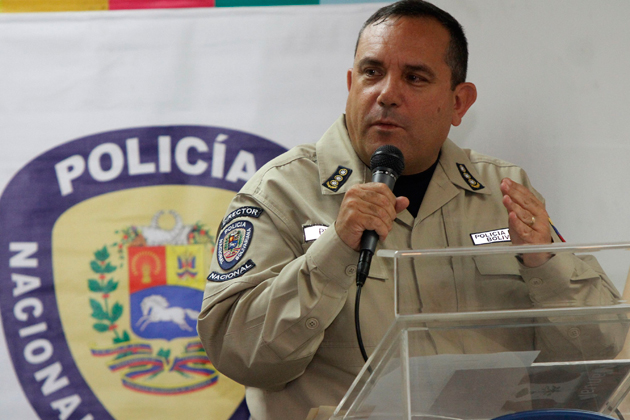The United States has sanctioned seven Venezuelan government officials for their role in human rights violations, as political violence and unrest continues to roil the country.
In an Executive Order announced on March 9, the turmoil in Venezuela was declared an “unusual and extraordinary threat to the national security and foreign policy of the United States.” The sanctions freeze the assets of the seven officials, including high-level military, police, and government officials that the United States says were directly responsible for grave acts of violence or other abuses.
Gustavo Gonzalez Lopez
General Gonzalez previously served as the head of Venezuela’s National Bolivarian Intelligence Service (SEBIN) and had been president of the Strategic Center for Security and Protection of the Homeland (CESSPA). In response to the US sanctions, Venezuelan President Nicolas Maduro appointed General Gustavo Gonzalez Lopez as Minister of the Interior.

Antonio Jose Benavides Torres
Torres is the ex-director of operations for the Bolivarian National Guard (GNB) and is a commander in Venezuela’s Bolivarian National Armed Forces. According to the White House, the GNB has engaged in severe violence and sexual assault against anti-government protesters.

Katherine Nayarith Haringhton Padron
A national level prosecutor who has brought charges of conspiracy against several opposition members related to alleged assassination and coup attempts, based on what the White House calls “implausible — and in some cases fabricated — information.”

Manuel Eduardo Perez Urdaneta
As director of Venezuela’s Bolivarian National Police, the United States says Urdaneta has engaged in “significant acts of violence of conduct that constitutes a serious abuse or violation of human rights.”

Justo Jose Noguera Pietri
Pietri is a former commander of Venezuela’s GNB and is now president of the state-owned Venezuelan Corporation of Guayana. The United States accuses the GNB of using excessive force against civilians and journalists in various cities around Venezuela.

Manuel Gregorio Bernal Martinez
Martinez is a former director of Venezuela’s Bolivarian National Intelligence Service and current chief of the 31st Armored Brigade of Caracas of Venezuela’s Bolivarian Army. Bernal headed the SEBIN in February 2014 when officials fired on anti-government protesters, killing two.

Miguel Alcides Vivas Landino
Landino is the inspector general of Venezuela’s Bolivarian National Armed Forces and is sanctioned for complicity in acts of violence against anti-government protesters.
According to Time, senior US administration officials said the purpose of the sanctions was to “shine a light on the abuse of human rights or public corruption” of government officials. Jacob Lew, US Secretary of the Treasury, said the decision has as a goal the protection of the financial system of the United States from “the flow of illegal finance from public corruption in Venezuela,” reported Infobae.
InSight Crime Analysis
This is not the first time the United States has sanctioned high-ranking figures in Venezuela based on their role in the heavy-handed repression of anti-government protests.The United States has also been outspoken in its criticism of official involvement in drug trafficking and other criminal activity, as well as links to transnational organized crime, and has designated at least eight Venezuelan government officials under the Foreign Narcotics Designation Act (Kingpin Act) for involvement in drug trafficking since 2008.
SEE ALSO: Venezuela News and Profiles
In 2014, the US State Department’s International Narcotics Control Strategy Report stated that, “Venezuela remains a major transit country for cocaine shipments via air, land, and maritime routes.” This, the report continues, is in part due to “sporadic international counternarcotics cooperation, and a permissive and corrupt environment.”
Just this past January, Leamsy Salazar, a former Venezuelan presidential security chief, accused Diosdado Cabello, the current President of the National Assembly, of being involved with drug trafficking.
While Venezuela has made an effort to go after low-ranking members of the military or National Guard, to date there has been minimal scrutiny of the involvement of higher ranks — as exemplified in the legal proceedings connected to the September 2013 Air France cocaine seizure.

